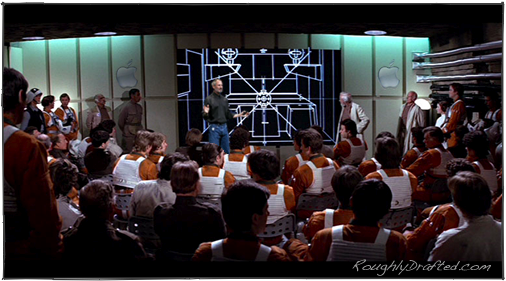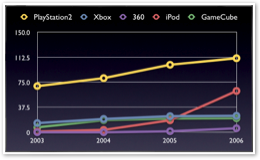

Readers Write About Apple's Open Source Assault
What is the Microsoft business that Apple is preparing to target with a resurrected product category newly reanimated by the power of open source?
Readers suggested a few ideas:
Game Consoles: The most popular suggestion was a new effort to target console gaming. That would resurrect Pippin, the ill fated game console with the soul of a Mac clone, built by Japanese toy maker Bandai in 1996.
Such an effort would copy Microsoft's Xbox strategy, which delivers the Windows PC in a simplified form as optimized for gaming as one can be at a $300-400 price point.
The problem with a reanimated Pippin, however, is that even Microsoft has made little progress with the Xbox despite its strength in PC gaming.
Sony sold 100 million PlayStation consoles prior to the arrival Xbox, and despite the initially fumbled rollout of its successor, managed to sell another 100+ million PlayStation 2 units after the Xbox appeared.
With its original Xbox, Microsoft only tied Nintendo for a distant second place, selling fewer than 25 million units; it did even worse with its second generation version, the Xbox 360. Microsoft's efforts in console gaming have lost the company billions of dollars; its entertainment division lost more than a billion dollars last year alone.
Despite all its investments in gaming, Microsoft has done nothing to dent Sony's console sales. The five year old PlayStation 2 actually outsold the new Xbox 360 over the last year, nullifying the impact of Microsoft's full year lead over the PlayStation 3 in delivering a next generation game system.
 Additionally, open source isn't yet offering much of a threat to Microsoft's use of its proprietary Direct X in games development, although things are starting to change.
Additionally, open source isn't yet offering much of a threat to Microsoft's use of its proprietary Direct X in games development, although things are starting to change. Sony is using open source code in the PlayStation 3, and in particular is supporting OpenGL development.
Since the company isn't yet manufacturing enough PlayStation 3 units to meet demand, it isn't yet clear how well the relatively expensive new console will do. Currently, the PS3's strongest competition is Sony’s own PS2.
Open source also got another nudge from graphic card maker nVidia. In partnership with TransGaming, it recently announced efforts to make games written for DirectX work on Intel Macs using its CgFX graphics framework and TransGaming's Cider. Essentially, both translate DirectX commands to run using OpenGL.
Any progress behind OpenGL benefits Apple's Mac OS X and the prospects for Linux games, and works to erode Microsoft's strong position in gaming based on DirectX.
Howerver, Apple's prospects in gaming are currently no match for Microsoft in the PC gaming world, let alone Nintendo and Sony in consoles; The Apple Video Game Development Myth explained why. Strike one.
Handheld Game Consoles: Since that article was published last summer, Apple released games for the 5G iPods, but they offer no significant challenge to dedicated handheld game consoles.
That product category has long belonged to Nintendo, which has sold over 100 million DS and Game Boy Advance units; Sony is in a distant second place with sales of fewer than 25 million PlayStation Portables.
While Apple has sold over 70 million iPods, less than half can even play games. The game titles available for the iPod are designed to be simple, casual games that can be played as a diversion; while they leap beyond what is available on most mobile phones, they are not in the league of portable, dedicated game consoles.
I believe Apple released iPod games primarily to test software deployment for the iPhone through iTunes.
Games and applications for the iPhone will trounce anything playable on today's mobile phones, particularly Windows Mobile. However, Microsoft doesn't make any money from its WinCE products, and open source doesn't appear to play a huge role in games development on the iPod or the iPhone. Strike two.
Office. Several people suggested Apple's efforts with iWork or some other Office-style application suite to take on Microsoft's cash cow of Office, one of the company's three highly profitable businesses.
Apple is not well served by attacking Office however. For starters, a lot of Mac users want and need Office, and its availability makes the Mac more attractive. Apple likes to trot out Office as an important Mac application.
Microsoft won't cancel Office for the Mac because it makes too much money on it, but if Apple were to strongly challenge Office sales on the Mac, it might change things.

In the early to mid 90s, Apple briefly and tepidly mounted an effort to sell its own office application suite under its Claris software subsidiary.
ClarisWorks was designed to take on the low end of Office sales, in the same league as Microsoft's simple Works suite; Claris had to deliver a Windows version to compete as a cross platform suite.
After Jobs pulled Claris back into Apple, the aging Windows version was canceled and the Mac version was renamed AppleWorks. Over the last three years, Apple has put together iWork as a replacement for AppleWorks, but it is significantly different in a number of areas.
First, unlike Claris, iWork and Apple's other recent applications aren't intended to compete in the general software market, but rather to deliver good, unique software for the Mac.
Apple will likely never port iWork applications to Windows, as that would defeat their sole purpose of distinguishing the Mac platform. Without a Windows version, iWork is no competition to Office.
Second, iWork isn't intending to copy the generic office suite format that was defined back in the 80s as:
-
•a word processor
-
•a spreadsheet
-
•a database
-
•a modem terminal
-
•a presentation package
-
•a calendar and contacts manager, later including email.
Microsoft's Office suite has delivered this same bundle of apps for the last decade and a half. Innovation has largely been delivered as a new colors of paint, different shaped fenders, and larger fins. It’s the same old car.
The former ClarisWorks, along with IBM's Lotus SmartSuite, Corel's WordPerfect Office, Sun's StarOffice / OpenOffice, and the KDE KOffice and GNOME Office suites for Linux have all tracked development of Microsoft Office with very similar products.
Apple's efforts with iWork do not. While Keynote follows the same overall pattern of PowerPoint, Pages is unlike a typical word processor at all, and iWeb--developed by the iWork team but included in iLife--similarly makes little effort to look or work like Microsoft FrontPage.



Most of Apple's new applications are clear departures from existing software models. That's because the company rethinks things rather than simply copying existing products. Troublemakers. Geniuses.
Open source office suites seek to rip-off Office entirely, just as the Linux desktop is mostly a clone of Windows. This partly stems from a desire to copy the software many people already know how to use, but it's also indicative of an engineering effort devoid of much creativity. All work and no play make a dull program.
That also explains why Apple has not made use of OpenOffice or other efforts designed to clone Office with free software; Apple doesn't want a cheap rip off of Office, it wants unique software that takes advantage of Mac OS X features and rethinks how to do things in smart and consistent ways.
There is nothing Mac-like about OpenOffice; it is written for X11 so that it can work across a wide swatch of different Unix-like distributions, and it attempts to behave and appear like Office for Windows. Apple wants software written to the native Mac frameworks, and which looks and acts consistent with iLife and iWork apps.
So in the world of Office apps, open source will do little to empower Apple's efforts, and Apple isn't interested in affronting Office anyway; it wants to offer compelling, modern applications, not some rehashed versions of apps conceptualized the 80s. Strike three.
Mac OS X: in addition to Consoles, Handhelds and Office, it's already well known that Apple has used open source to confront Windows on the desktop with Mac OS X. Of Microsoft's three major business, that only leaves one: servers.
In 2006, Microsoft made profits of over $10 billion from Windows, $8 billion from Office, and another nearly $4.5 billion on servers, which includes Windows Server licensing and Exchange Server.
Apple has long had a Mac OS X Server product, but in 2007, Apple will be targeting a new push aimed at Windows Server and Exchange with Leopard Server and its open source powered Calendar Server and Teams.
Next Articles:
This Series


 |
|
 |
|
 Del.icio.us |
Del.icio.us |
 Technorati |
About RDM :
:
Technorati |
About RDM :
:

Monday, February 12, 2007





 Send Link
Send Link Reddit
Reddit NewsTrust
NewsTrust






